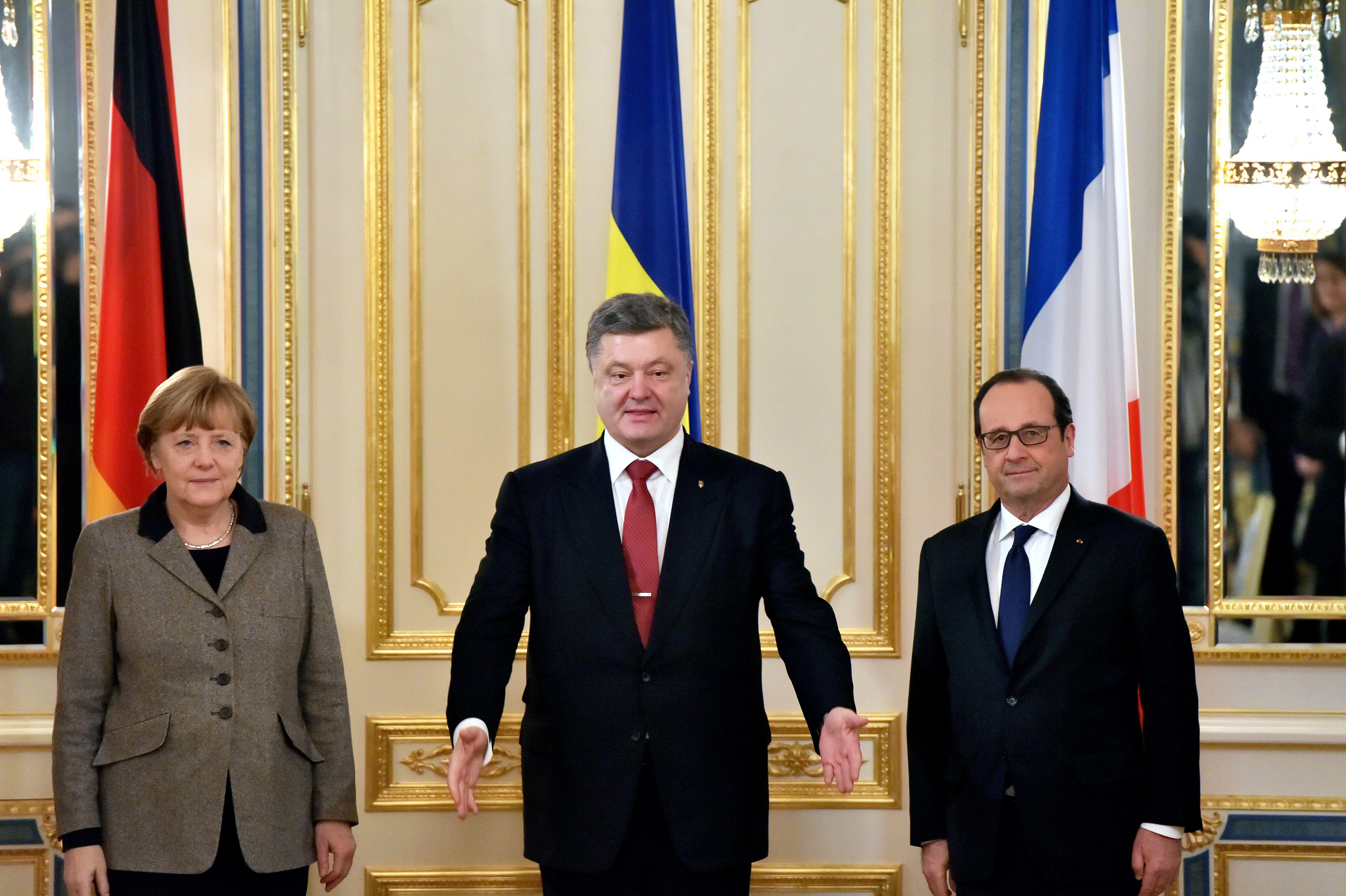Western leaders launched a new diplomatic offensive Thursday to end the violence in Eastern Ukraine. German Chancellor Angela Merkel, French President Francois Hollande, and U.S. Secretary of State John Kerry are in Kiev for talks with the Ukrainian government. On Friday, Merkel and Hollande are continuing on to Moscow to present a proposal to end the violence and guarantee Ukraine’s “full territorial integrity.”
I’m skeptical. Kiev and the pro-Russian rebels agreed to a cease-fire in Minsk in September, but violence resumed soon after, and both NATO and the Ukrainian government say Russia has continued its support of the rebels. The latest initiative comes amid a bloody battle over the Ukrainian-held railway hub of Debaltseve.
Securing an agreement that will actually last more than a few weeks is a daunting challenge for two main reasons. One is that the two sides are operating in completely different versions of reality. Ukraine and its western allies consider Russia to be the main aggressor in this conflict and accuse Moscow of directly backing the separatists and sending troops over the border into Ukraine. But the Russian government has, since the beginning of the conflict, denied sending in troops or backing the rebels, claiming that any Russians who are there are volunteers fighting on behalf of their fellow Russian speakers against the “fascist” western-backed junta in Kiev. Getting Russia to agree to pull out of Ukraine is going to be challenging if Russia won’t agree that it’s there in the first place.
The second important factor to recognize is that Vladimir Putin knows he has the upper hand here. Russia has more resources to throw into this fight than Ukraine does, which is the reason there’s growing support for the idea of the U.S. supplying the Ukrainians with weapons. The U.S. and Europe even seem to be operating something of a good-cop–bad-cop routine, with the Obama administration floating strong hints about sending weapons while Merkel rejects the idea and pushes for more talks.
But Putin also likely realizes that the U.S. isn’t willing to commit enough resources to really turn the tide on the battlefield. So, given that the pro-Ukrainian side has neither the means nor the will to force Russia to back down, how can he be convinced to leave?
Crimea. According to a report by Bloomberg’s Josh Rogin in December, Kerry has been trying to sell his Russian counterpart Sergei Lavrov on adhering to the Minsk agreement and ceasing its military support for the rebels. In return, Western countries would lift some sanctions and set the issue of Crimea—the majority–Russian-speaking enclave which has been under Russian control since last March—to the side for the time being, which would effectively leave Russia in control of the peninsula unchallenged if not formally recognized. It’s not clear if this is the plan Kerry is discussing in Kiev, but it jibes with a number of peace-plan proposals recently floated by U.S. think tankers.
A final resolution would also have to address the question of Ukraine’s relationship with Europe, a major sticking point with Moscow. The Ukrainian government seems unlikely, for good reason, to agree to the humiliation of pledging not to join NATO because of Russian discomfort. But European governments could provide Moscow with assurances that Ukraine is unlikely to be granted NATO membership any time soon (for reasons discussed here), which would help secure a deal. Ukraine will probably also have to take some steps to grant more autonomy to its eastern regions, filled with ethnic Russians, which it has already proposed doing.
In a recent blog post, NYU Russia scholar Mark Galeotti reluctantly agreed that these concessions are probably necessary, but argued that Ukraine should get more for the deal. Any agreement should go past simply requiring Russia to stop its military support for the rebels, he argues, and also require it to “cooperate in active measures to end the fighting, such as by offering asylum to those rebel leaders for whom there is no scope for reconciliation with Kiev.” Galeotti also suggests that Russia be required, as reparations for the conflict, to cut Ukraine a break on its energy bills.
Under such a deal, Putin would get to declare victory over Crimea and win more political rights for the ethnic Russians in Eastern Ukraine. He could agree to crack down on the “volunteers” going into Ukraine without ever acknowledging that Russia played a role in sending them. He’s shown willingness to sell out the separatists in the past when it’s suited his purposes. Sanctions would be slowly lifted only after demonstrable progress on the ground.
In the meantime, the U.S. and Europe would both amp up their economic support for Ukraine and deepen defense cooperation with other countries in Eastern Europe. While both Ukraine and its supporters in the West will be reluctant to grant Putin a political win, they can be secure in the knowledge that he’s still running a country whose economic and political problems run much deeper than sanctions.
Such a deal is admittedly a long shot because its success relies on the assumption that Putin wants to resolve the conflict. You’d think that’s a no-brainer: The crisis has only deepened Russia’s economic isolation and trapped Putin in a potentially disastrous cycle of military escalation that, whether he acknowledges or not, will only lead to more Russian deaths. But as one German diplomat told the Financial Times recently, “Maybe he’s not interested in restoring order. Maybe his advisers are telling him that Russia is better off in a world without order.” I guess we’ll find out soon.
